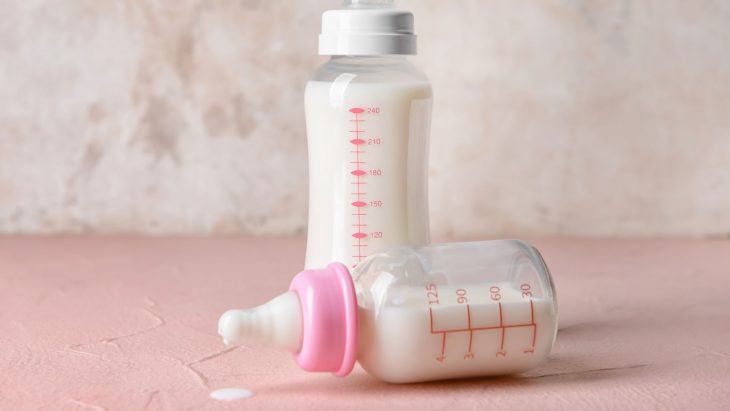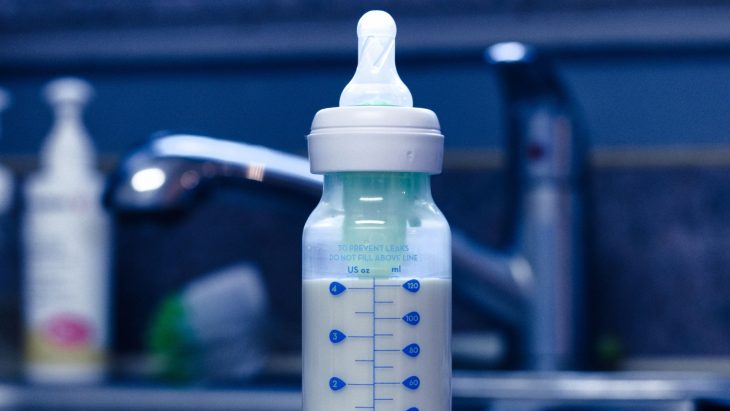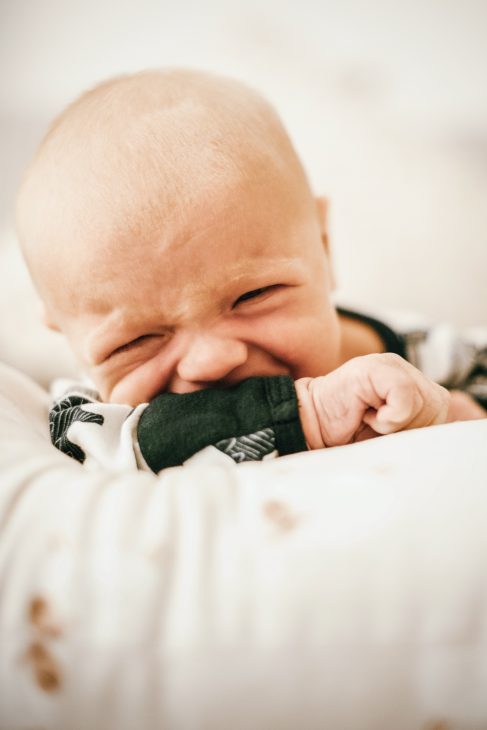What happens if baby drinks old formula? Will he or she puke? Will they pass out? Or will they acquire a life-threatening illness? Relax. Though feeding your baby old formula certainly is something to be concerned about, it likely won’t cause your baby major harm. Still, depending on the circumstances surrounding the situation and your baby’s current health, there could be reason for you to worry. So, what should you be looking out for after mistakenly serving your baby old formula? We’ll answer that and more in today’s post.

Is It Bad For Babies to Drink Old Formula?
Yes, it is bad if your baby drinks old formula. Still, it likely isn’t the end of the world if you mistakenly do this once.
But please, don’t make it intentional.
The reason that it is bad for babies to drink old formula is that, similar to regular cow’s milk, it can go bad when sitting at room temperature. Even normal milk that adults consume goes bad within 2 hours at room temperature. Baby formula is the same way. In fact, in very warm conditions or extremely hot climates, your baby’s formula may only last 1 hour instead of two.
So, what if you do accidentally give your baby old formula to drink? Is it really that bad?
Yes, it is!
Although your baby will likely be okay, it still isn’t the ideal scenario. Your baby can develop signs of illness or distress, and may acquire food poisoning depending on their immune system’s ability to ward off illness.
Also, be aware that giving your baby infant formula that is past its expiration date is just as risky. Always serve up the freshest milk possible to your baby to ensure his or her health stays intact.
Note: Many people associate cronobacter sakazakii, a toxic germ, with old infant formula. While it is true that your baby may contract this pathogen from old formula, it is also important to note that your baby may acquire this even from fresh powdered formula. This pathogen is even often found lurking on home surfaces. Therefore, it is imperative that you pick the freshest formula possible and keep it free of contamination as much as is possible. And this, of course, includes only serving your baby formula that has been freshly made up.

What Happens If You Feed Baby Leftover Formula?
If you fed your baby leftover formula, first off, don’t panic. At most, your baby will likely vomit or have diarrhea. This is your baby’s body’s way of dispelling the food that they reject.
Still, it is important to monitor your baby for signs of distress. If you notice your baby crying excessively, developing a fever, has low energy, oris exhibiting poor feeding habits, be sure to phone your doctor right away. All of these symptoms can signal something serious, and you’ll want to get your doctor on the phone pronto before conditions worsen.
In addition, be sure to keep in mind the health of your child to determine whether or not your child is at an increased risk. Increased risk factors include:
- Babies born prematurely
- Babies with compromised immune systems
- Babies under 2 months old
Also note that diseases like cronobacter sakazakii can affect your baby through other means. To keep you baby safe and prevent him or her from acquiring this potentially fatal disease, consider the following steps:
- Thoroughly clean and disinfect all work surfaces before beginning to prepare a bottle.
- Wash your hands.
- Boil the water you plan to use to prepare your baby’s water for at least three minutes before allowing it to cool for another 5 minutes.
- Pour the boiled water into a sterilized bottle.
- Add the proper amount of formula to the bottle according to the manufacturer’s instructions.
- Shake the bottle while capped (do not stir the mixture).
- Place the bottle in an ice bath to cool it to room temperature before feeding your baby. Be careful not to get the cooling water into or onto the nipple of the bottle.
- Before you feed your baby, test the temperature of the milk on your wrist. If the milk still feels hot do not give it to your baby.
- Serve the milk within 2 hours of having made it up. After your baby starts drinking, you must use the rest of it within 1 hour of the beginning of the feeding session.
How Long Does Formula Last Once Made Up?
Remember that once made up, infant formula lasts about 2 hours at room temperature. Having said that, once your baby starts feeding, you should have him or her finish the bottle within 1 hour of the start of the feed.
If you are unable to use the bottle within 2 hours of it being made, you may place the unused bottle in the fridge for up to 24 hours. Be sure to have your baby consume the bottle within this amount of time.
Within the 2 hour frame of having made up the bottle, try not to reheat the formula if you don’t have to. If you must, you may reheat it only once. After that, you should refrain from heating the bottle as this can breed bacteria.
Note: When reheating bottles of formula, please be sure to use a gentle method. A great way to reheat formula is to place it in a bowl of hot water or to do so gently over the stove. Though often recommended, we do not advise you to warm your baby’s milk in the microwave. Doing so can produce hot pockets in your baby’s milk, meaning that it heats unevenly and can scorch your baby’s mouth.
What Happens If Baby Doesn’t Finish Formula Bottle?
So, what should happen if your baby doesn’t finish his or her formula bottle? You may find yourself wondering, “Should I throw away leftover formula?”
The answer, unfortunately, is yes. Though it may feel wasteful, you really are doing the best thing for your baby.
Remember that once saliva hits the nipple of the bottle, bacteria is introduced and is compromising the cleanliness of the bottle and milk going forward. Thus, after an hour of having been fed, you are now increasing the risk of illness by continuing to feed your baby the bottle or attempting to refrigerate it.
Only refrigerate formula milk that has sat at room temperature no longer than 2 hours and that has been untouched by your baby. Even if those conditions are met, you should only feed your baby the formula within 24 hours of refrigeration. Otherwise, your baby is at risk of illness.
Symptoms of Baby Drinking Spoiled Formula
Still wondering more about what happens if baby drinks old formula? Check out these commonly asked questions related to the topic now.
What Happens If My Baby Drinks Formula Over an Hour Old?
Assuming the formula has not yet been touched by your baby, you still have another hour to use the bottle before it needs to be placed in the fridge. If your baby did drink the bottle, you will need to pitch it one hour after the feeding has passed.
What Happens If Baby Drinks Formula After 2 Hours?
So, what happens if baby drinks 2 hour old formula? The baby is potentially at risk. Lower his or her chances of developing foodborne illness or other serious conditions by ditching the milk before this point. If you’ve already given the bottle, watch your baby for signs of distress. One bout of vomit or diarrhea can be expected, but anything more than that may require a phone call to the doctor just to ensure everything is okay.
What Happens If Baby Drinks 3 Hour Old Formula?
If your baby drank 3 hour old formula, watch him or her for diarrhea and vomiting. If you notice unusual behavior, excessive crying, or fever, please consult with your doctor.
Baby Drank 24 Hour Old Formula
At 24 hours, there may be a significant amount of bacteria present in the milk your baby consumed. Though he or she may be alright, it may be best to phone your doctor to make sure. Also, if your baby drank 5 hour old formula, or your baby drank 6 hour old formula (or even if your baby drank 12 hour old formula) you may still need to reach out to your doctor.
You don’t want to take a chance with your baby when it comes to infant formula because there are diseases connected to it that can be life-threatening to your baby.

What Happens If Baby Drinks Old Formula? It Can Be Risky…
Though your baby will likely be okay if they consume formula that’s old, you need to know there are risks associated with this practice. Never do this intentionally. If you mistakenly serve old formula, watch your baby closely to determine if he or she may be sick and need to see a doctor.
Als, never feed your baby powdered infant formula that has gone beyond its expiration date. Doing so significantly compromises your baby’s health, and the risk isn’t worth it!
FAQs
He or she may throw up or have diarrhea. Keep an eye on it and phone our doctor if symptoms don’t resolve.
It can upset your baby’s tummy and introduce bacteria to their immature immune system. THis can potentially cause life-threatening illnesses. Please don’t intentionally give your baby formula that’s been expired one month.
Check the date on the label. If the milk has been sitting out more than two hours, pitch it. Obvious signs are changes in consistency and smell.
Watch your baby closely for signs fo distress. If your baby is vomiting and having multiple bouts of diarrhea, be sure to see a doctor immediately.
Leave a Reply